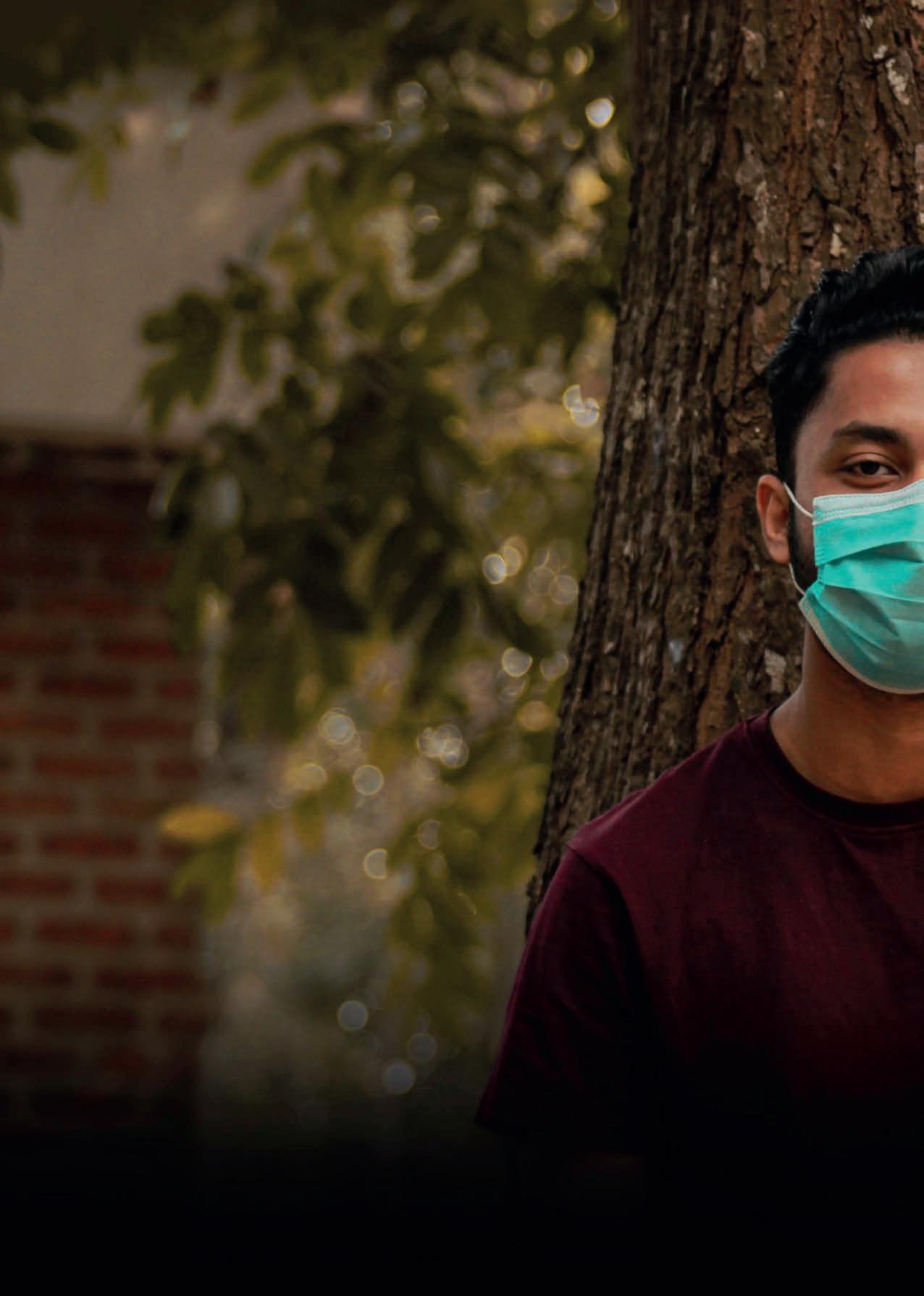
7 minute read
MEET YOUR AUDIENCE: GEN Z AT A GLANCE
AN INDIAN GEN Z STUDENT’S PERSONA: MEET SHIKHAR*
Shikhar is 21 years old, living in the metropolitan city of Pune. He has completed a Bachelors in Business Administration from the Symbiosis Centre of Management Studies in Pune. Coming from a humble background and being the only child, he aspires to make it big and to make his parents proud one day.
He wishes to pursue a Masters in Business Administration abroad and is exploring countries like Canada, Australia and Singapore at the moment. Since graduating during the pandemic, he didn’t have much of a college life and didn’t get a chance to meet his classmates and interact with them. In fact his graduation was online! Overall, his graduation experience was bittersweet - he liked waking up and being able to attend classes online but the pandemic has taken a toll on his mental health as he worries about his professional future. He has little information on proceeding with university applications and with a ‘something is better than nothing’ approach, he has decided to take up a campus placement internship.
Shikhar loves spending time on Instagram - a platform that he feels is relatively clutter-free, compared to other social media platforms. He loves knowing what his friends are upto but often finds news and calls for activism on Instagram that his friends circulate.
Although Shikhar graduated, he feels that he doesn’t possess the skill sets to convert his current internship at Bajaj FinTech into a full time job. So, he has enrolled in a Business Analytics programme on Coursera and has taken up an Unacademy subscription. He intends to appear for Indian competitive exams for management programmes. He likes the flexibility that these platforms offer. His biggest goal is career growth and he is trying to self-learn to be able to make his next big education move.
*The persona is representative to bring to life some key findings from the survey.
MEET YOUR AUDIENCE: GEN Z AT A GLANCE

AN INDIAN GEN Z STUDENT’S PERSONA: MEET SHIKHA*
Shikha is a 19 year old, who grew up in the Southern port city of Visakhapatnam in Andhra Pradesh. She is a second generation engineer and her parents wanted her to gain the technical skills that an engineering degree brings. Shikha is pursuing Mechanical Engineering from National Institute of Technology, Surathkal.
Studying during the pandemic was a challenge for her, she found her attention span dwindling and her screen time had become excessive. Often, her entertainment modes also involve additional screen-time she loves watching Hollywood movies on Netflix and likes grooving to Korean songs by BTS.
Being an engineer by profession, she is an explorer at heart. So, she pursued an internship with an education NGO - Teach for India, during her undergraduate degree. She feels passionate about social justice and feels that India lacks high quality education for most. The pandemic has made her realise that basic services like health and education are the bare minimum that youth should really demand, from governments.
Apart from engineering, she has heard about newer subjects like ‘Liberal Arts’ booming in India. Shikha was moved by reading ‘I am Malala’ - while she finds leaders like Malala and Alexandria Cortez motivating, she is closest to her youngest sister and mother.
Shikha’s ultimate dream is to be a financially independent young woman and is exploring MTech courses abroad. Her preferred countries are New Zealand and Australia, as she has heard among the Indian diaspora abroad that US work visa permits are becoming tougher by the day. Shikha has worked on strengthening her Linkedin profile as it’s her go-to avenue for knowing about newer opportunities and for learning
*The persona is representative to bring to life some key findings from the survey
KEY FINDINGS

1. THE INDIAN GEN Z STUDENT’S LIFE CONTEXT
DEEPEST INFLUENCES
For 75% of students their deepest influences are personal experiences followed by peer groups (62%) and family (61%). And hence HEIs need to tap into personal networks: family and friends to spread the word.
IMMEDIATE FOCUS
Career growth is the most pressing, immediate focus (for 39% of students) followed by paying attention to mental health (21%) and to their education (21%). With this, HEIs need to make the career growth-education connect clearer while pitching programmes.
VIEWS ON SUSTAINABILITY
93% of students think about sustainability in their everyday life, with Quality Education, Zero Hunger and No Poverty as their most immediate Sustainable Development Goals. HEIs need to integrate sustainability and SDGs in their teaching-learning process - they clearly strike a chord.
STRESSES AND ANXIETIES
With mental health stresses and anxieties being amplified due to COVID-19, ‘Career Growth’ and ‘Job Prospects’ are top triggers. HEIs need to consider how best to support students in overcoming their stresses and anxieties.

ROLE MODELS AND INFLUENCES
Students are primarily inspired by role models such as - Malala and Modi (27% and 26% respectively) indicating a preference for role models that have showcased strong credentials in the development field or who like to walk the talk through their deeds. How can HEIs tap into popular student influences to build their institution’s narrative?
YOUR VOICE MATTERS
2. THEIR ONLINE AND SOCIAL MEDIA WORLD
TIME SPENT ONLINE
60% of students spend one to four hours on social media platforms and 18% spend more than four hours. This calls for an urgent need for HEIs to tap into online media platforms for outreach - that’s where they are most likely to find their prospective students.
POPULAR SOCIAL MEDIA PLATFORMS USED
73% of students use two or more social media platforms. Instagram is the most popular social media platform used by 96% of respondents followed by Facebook (50%) and Snapchat (42%). HEIs must keep visual, evocative means of reaching out to students via popular social media platforms.
DIVERSE ACTIVITIES ON SOCIAL MEDIA
Apart from social networking, social media has become an important lifeline. It doubles up and acts as:
1. A major source of news 2. An avenue for learning 3. A means for activism
HEIs need to recognise that ‘social media’ is not just for the social, it's for learning, it's for updating oneself with news, to build communities.
How can HEIs devise creative ways to leverage social media for circulating news, learning and building community bonds?

YOUR VOICE MATTERS
3. IMPACT OF COVID-19 ON HIGHER EDUCATION
NEGATIVE IMPACT OF COVID-19 ON HE OUTCOMES
60% of students highlight a negative impact of COVID-19 pandemic on their higher education plans. Those negatively impacted voice the need for and lack of holistic learning opportunities. The question is how can HEIs do better at recognising and changing their offerings based on COVID-19’s negative impact on students?
MENTAL HEALTH IN FOCUS
COVID-19 has amplified the importance of mental health (21%) as one of student’s key focus areas. So much so that mental health concerns have taken a marginal lead over the need to focus on education (20.8%). There is a greater need to understand how HEIs can provide better mental health support to their students.
SHIFT IN MINDSET TOWARDS EDUCATION
Students are reflecting on their surroundings and the changing context. 49% of survey respondents said there needs to be equal access to opportunities. They desire to change the world through their learning and work. This begs the question how can HEIs integrate the changing global context in the classroom and cater to students’ aspirations to do good and make a difference to the world?

YOUR VOICE MATTERS
4. A GROWING DEMAND VOICED FOR ONLINE LEARNING
RISE OF SELF-LEARNING
Of students who reported positive educational outcomes, despite COVID-19, 75% have enrolled in new online programmes and learnt new skills. Hence, how can HEIs cater to students who desire to take charge of their learning and pick up new skills?
NEED FOR ‘BLENDED LEARNING’
60% of students indicate and voice a negative impact - mainly due to a move to online learning during the COVID-19 pandemic and addressing the need for more blended learning platforms has been voiced by 33.33% of these students. How can HEIs build effective, interactive tech-based blended learning models?
UPTAKE OF E-LEARNING PLATFORMS
Unacademy (34%), LinkedIn (23%), Coursera (16%) and Udemy (14%) emerge as winning online-learning platforms to supplement classroom learning. How can HEIs effectively collaborate and partner with these e-learning platforms to increase their reach, up their offerings and improve student learning?

MORE ‘FLEXIBLE’ AND ‘SPECIALISED’ EDUCATION
Having a host of courses to choose from online, students expect more from traditional education systems. 38% of students voice the need for greater flexibility and specialisation in higher education. How can HEIs step up their offerings to match up to and supplement flexibility and specialisation that e-tech brings?






